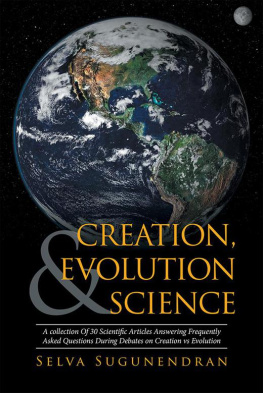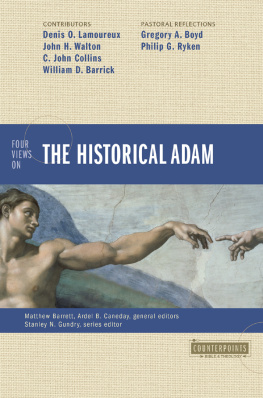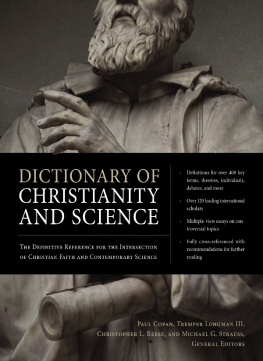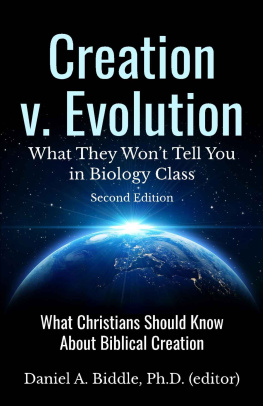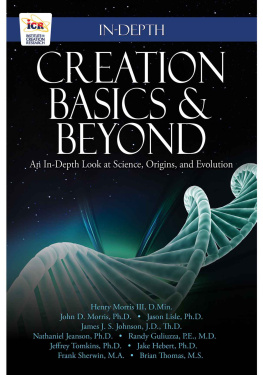D uring the writing of my 500 page Evolutionary Creation: A Christian Approach to Evolution (2008), I recognized the need for a shorter and more accessible version of the book. I Love Jesus & I Accept Evolution is an attempt to outline the main points and arguments. Many who assisted me with the first book graciously agreed to contribute their time and expertise to this work.
Words cannot express how grateful I am to Anna-Lisa Ptolemy for her tireless and meticulous work on the early drafts of the manuscript. I also appreciated her insights on the anatomy of bird bones in chapter 5. Many thanks to Andrea Dmytrash, Braden Barr, and Kenneth Kully for their artwork. They were amazingly patient with me, and my incessant requests for changes to the diagrams. And I am thankful to my copy-editor Nancy Shoptaw. She purged the manuscript of excessive hyphens, capital letters, and Canadian-isms. The book is now in proper American, eh. Other wonderful friends and colleagues who provided support include: Edward Babinski, Chris Barrigar, Devadas Barrigar, Mike Beidler, Michael Caldwell, Joel Cannon, Bernie Dehler, Peter Enns, Trevor Froehlich, Jim Hoover, Murray Gingras, Nancy Halliday, Patrick Harrison, Margolee Horn, Marguerite and Ron Huggins, Douglas Jacoby, John Lang, Anthony Maiolo, Jack Maze, Terry Morrison, George Murphy, Amelia Reising, Jim Ruark, Anita and Paul Seely, Bethany Sollereder, Callee Soltys, Bonnie Topp, Martin Unsworth, Karima Yacoub, and Sharon Young.
Preface
T his is a true story. A number of years ago I attended a conference on the relationship between science and religion at a leading university. One evening there was a public lecture that featured one of the most important anti-evolutionists in the country. During the question and answer period, a young man came to the microphone in front of about one thousand people. In a very respectful way, he asked a simple question, What about dinosaurs, how do they fit into the Bible?
I will never forget the answer that this university professor gave. In a mean-spirited tone, he scolded the young man, This is an irrelevant question. It doesnt matter because it has nothing to do with what Im saying tonight. And then there was dead silence. It was a very awkward and uncomfortable moment for everyone in the auditorium, including a number of individuals who were associated with this professor and his view of origins. In fact, I was sitting with a number of these anti-evolutionists. Without any response, the young man turned away from the microphone, walked up the aisle, and went out of the auditorium. No one got out of their seat to follow him. Not even one of the Christian anti-evolutionists with whom I was seated.
But I immediately sensed the Lord calling me to comfort this young man. Yes, me, of all people, an evolutionist! I went out to the foyer and found him. He was shaking like a leaf. I introduced myself as a university professor and complemented him on what I thought was an excellent question. And then he said to me with trembling voice, All I wanted to know from
Dr. _______ was where do dinosaurs fit into the Bible, because I would like to tell my high school friends. Wow! Here was a 16- or 17-year-old boy who had the courage to stand up before a large audience at a major university and ask a question that he believed would help his high school classmates understand the relationship between Scripture and science. He wanted to explain and defend his Christian faith to his friends.
I realized I had a problem. I had just affirmed this students question, but how would I explain in only a few minutes where dinosaurs fit into the Bible? My university career has focused on the modern origins debate and questions like this one. But there are no quick and easy answers. I felt handcuffed. Standing before me was a teenager who, along with his classmates, had grown up watching the Jurassic Park movies. They all know that dinosaurs once existed. And here was a young man with a solid faith and a question that undoubtedly many Christians his age have asked. I wanted to tell him that I love Jesus and that I accept evolution. But this was not the right thing to say at that volatile moment. It would only have added to the confusion. All I could do was affirm his wonderful faith, remarkable courage, and intellectual integrity. I told him that loving God with our mind, as Jesus has commanded us, requires that we ask tough questions like the one he had just asked the speaker. I knew he wanted more, but I couldnt deliver it.
This honest question and shameful answer still echo in my soul years later. As a matter of fact, they have inspired me to write this book. In many ways, it is my attempt at offering a response to this high school student and his classmates. The answer that I give will surprise a lot of Christians. First, I will suggest that the purpose of the Bible is not to reveal scientific facts about how God created the world. To use the words of Billy Graham in the epigraph at the front of this book, The Bible is not a book of science. In the same way that the Lord meets each of us wherever we happen to be, the Holy Spirit came down to the level of the ancient biblical writers and used their understanding of nature to reveal that He was the Creator of the entire world. The intention of the biblical creation accounts is to disclose spiritual truths for nourishing our personal relationship with Jesus.
Second, I will propose that God created the universe and life through evolution. This view of origins is known as evolutionary creation. It claims that evolution is a creative process similar to that which the Lord uses to form every one of us in our mothers womb. No Christian today believes that God comes out of heaven to attach an ear, nose, or arm to a developing baby. Instead, we understand that He employs natural processes to create human beings. In fact, God is the creator of all the laws of nature, including these developmental (embryological) mechanisms. I believe that this is also the case with evolution. The Creator planned and maintained evolutionary laws and processes in order to create the entire world and us. In other words, our origin is not a fluke or mistake.
My view of origins is built on the traditional Christian belief that the Lord reveals Himself through Two Divine Books. First, the Book of Gods Words is the Bible. It discloses that we are the only creatures who were made in the Image of God, and that our Creator loves us more that we can ever imagine. I personally understand the power of Scripture. By reading the gospel of John, I was born again thirty years ago. Experiencing the fact that Jesus died for our sins and then rose physically from the grave changed my life completely and forever. Today, I drink from the Bible every morning for my spiritual nourishment in order to strengthen my personal relationship with the Lord. Second, the Book of Gods Works is the natural world. Modern science examines its structure, operation, and origin. Microscopes and telescopes assist in revealing that the creation is incredibly amazing! Beauty, complexity, and functionality in nature point to the mind of God. Stated in another way, the universe and life reflect intelligent design.
The Two Divine Books complement each other in revealing the glory and character of the Creator. I will propose an intimate and fruitful relationship between Biblical faith and evolutionary science. Scripture discloses the spiritual character of the world, while science reveals the divine method of creation. To be sure, such a provocative claim is rarely heard in our churches. This might be offensive to some. But no insult is intended, and I will ask my brothers and sisters in Christ for their patience as they read this book.
In order to understand my view of origins, I strongly advise that the chapters be read in sequence. The conclusions in later chapters are dependent on the terms and ideas presented in earlier ones. There is a short glossary at the back of the book to assist readers with the terminology. I suggest that they introduce themselves to these concepts before starting chapter 1.



